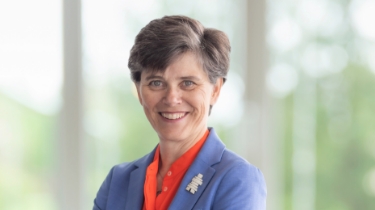
EDC continued to advance its ESG practices, both to build our own foundation and to offer more value to our customers.
As Canada’s export credit agency, we recognize that our long-term sustainability is tied to the international success and sustainability of our customers.
That’s why strong ESG practices are a key element of EDC’s 2030 strategy, and why we’re committed to embedding environmental, social and governance (ESG) throughout the organization.
And, if there was ever a time to understand the value of responsible business growth, it is now.
Governments and regulatory bodies are implementing higher ESG standards, requiring companies big and small to report more fully on the impact they’re having on people and the environment. New legislation around supply chains, like Bill S-211 in Canada and the Corporate Sustainability Due Diligence Directive in the EU, is making companies more accountable for their suppliers, in effect making ESG a deciding factor when awarding contracts.
Then, there are the reminders of why ESG needs to be a strategic priority: 2023 was the hottest year on record, with extreme weather events—like the unprecedented wildfires in Canada—affecting every corner of the world. Major armed conflicts also brought human rights issues to the fore, and increasing inflation exacerbated economic challenges.
Against this backdrop, EDC continued to advance its ESG practices, both to build our own foundation and to offer more value to our customers: we launched a Sustainable Finance Framework to provide greater visibility into how we track and report on this growing part of our business; we issued our fifth Climate-Related Disclosure, which every year becomes more thorough and closely aligned with the Task Force on Climate-related Financial Disclosures (TCFD) framework; we completed our fourth climate scenario analysis, which helps the organization understand and better manage climate-related risks and opportunities in our financing and underwriting; we joined the Taskforce on Nature-related Financial Disclosures (TNFD) Forum and began to gauge EDC’s impact on biodiversity; and, following extensive consultations, we updated the five policies in our Environmental and Social Risk Management Policy Framework, which supports the work we’re doing to meet net zero emissions by 2050, respect human rights, enhance transparency and support our customers’ transition to a low-carbon economy.
External engagement also remained a priority for the sustainability group in 2023. We hosted two ESG Advisory Council meetings, one on EDC’s ESG scorecard and impact framework and the second on our inclusive trade and Indo-Pacific strategies. In June, we convened our second civil society roundtable, during which EDC’s executive team engaged with seven civil society organizations on EDC’s ESG-related operations and performance. On the international front, I was pleased to participate in the UN Forum on Business and Human Rights in Geneva where, among other takeaways, the importance of adopting a human rights–based approach to climate action was made clear. I was also a member of the Canadian delegation at COP28 in Dubai, where EDC joined the UN-convened Net Zero Export Credit Agencies Alliance (NZECA) as a founding member. While there, it was encouraging to see the collaboration and innovation among the international export credit agency community, the willingness to share best practices and the mutual commitment to a more sustainable and lower carbon economy.
Toward the end of 2023, EDC took an important organizational step forward in combining the sustainability and risk groups, which is why this is a CRSO message rather than a CSO message. With the ever-intensifying global risk environment that Canadian companies face, and the increasing interconnectedness of financial and non-financial risks, both for our customers and for EDC, we see many benefits to combining the two disciplines under the same leadership. And to help keep pace, we will continue to mature our risk management framework to ensure sound governance.
As we look ahead now, EDC’s focus will be on advancing our net zero by 2050 ambitions, engaging with customers on their ESG journeys, bringing more rigour to the management of human rights risk in our supply chain, and managing our own carbon emissions along with those in our portfolio. This is how we will continue to deliver on our strategic commitment to people, the planet and prosperity for Canada.
Lorraine Audsley
Chief Risk and Sustainability Officer
